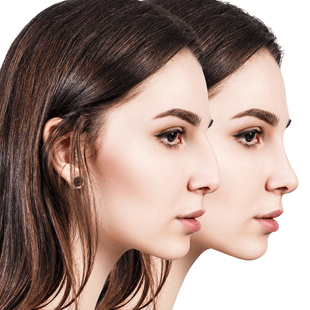Take the Next Step
Interested in a consult with one of our board certified cosmetic surgeons? Let us help you love the way you look.
Rhinoplasty is referred to as nose reshaping. Cosmetic nose surgery can do more than improve your appearance, it can improve your ability to breathe. Nose reshaping gives you a more attractive shaped nose and puts your nose in better proportion with your other facial features. At the Henry Ford Center for Cosmetic Surgery, nose reshaping is often combined with chin augmentation to create a more balanced facial harmony.
Rhinoplasty requires a tremendous amount of skill and technique. Our board certified physicians at the Henry Ford Center for Cosmetic Surgery have unique training in this regard.
Interested in a consult with one of our board certified cosmetic surgeons? Let us help you love the way you look.

During your consultation, the surgeon will perform a complete evaluation of your nose, including function and the balance of your nose in relationship to your other facial features. Any cosmetic concerns will be evaluated, including profile bumps, size, width, length, tip fullness, crookedness, nostril asymmetry, etc.
The surgeon will then discuss a detailed plan for what to expect from the surgery. Photographs will be taken.
Surgery is done as an outpatient. There is often swelling over the nose and around the eyes, as well as some bruising. The majority of swelling resolves in the first 1-2 weeks after surgery, however final results make take several months to see. Work and strenuous activities can be resumed within 1 week of surgery.
Some Insurance companies will cover portions of the surgery if done for the purpose of breathing difficulties, however, simply a reshaping of the nose is generally not covered.
The majority of the swelling resolves in 1-2 weeks, however, the finer changes especially in the tip of the nose may take up to a year to become noticeable.
The surgeon will discuss with you the types of changes that are or are not possible, keeping in mind your overall facial features. The goal is to create a natural appearing nose, which is in balance with the rest of your face.
Surgery is most often recommended for healthy men and women above the age of 15. It is important that patients have reasonable expectations and are committed to their overall good health and well-being.
The surgery is performed in an operating room under general anesthesia and under the supervision of an anesthesiologist.
We use cookies to improve your website experience. By using this site, you agree to our Terms of Use. Read our Internet Privacy Statement to learn what information we collect and how we use it.